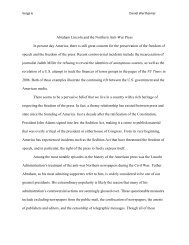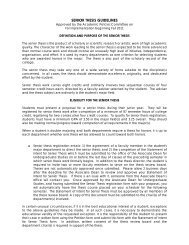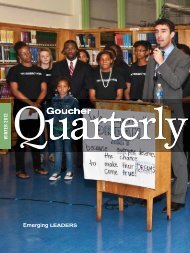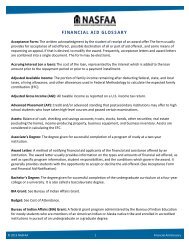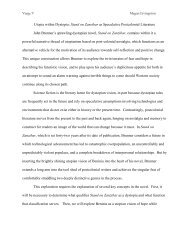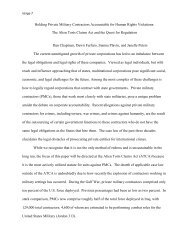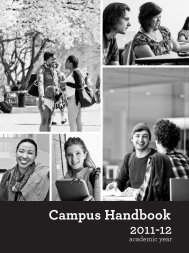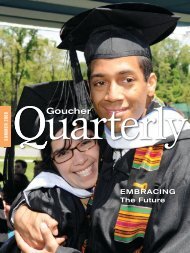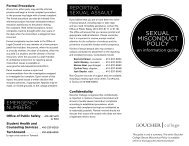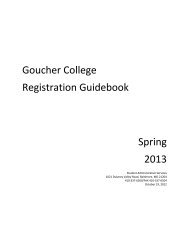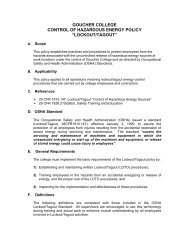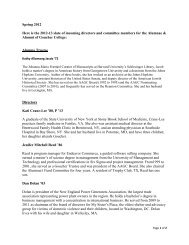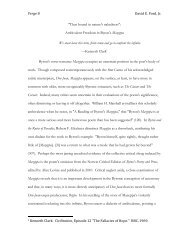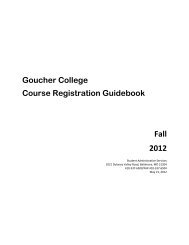AP® Summer InStItute - Goucher College
AP® Summer InStItute - Goucher College
AP® Summer InStItute - Goucher College
You also want an ePaper? Increase the reach of your titles
YUMPU automatically turns print PDFs into web optimized ePapers that Google loves.
Preparing Students for <strong>AP®</strong> Physics<br />
AP 554.100<br />
Patricia Zober<br />
The goal of this course is to prepare teachers for the AP B Physics, AP C Mechanics,<br />
and AP C Electricity & Magnetism courses and their exams. The course will emphasize<br />
the AP Physics exams, their structure, and their grading; the laboratory experiences<br />
in AP B and AP C Physics; the curriculum for each course; the exchange of ideas; and<br />
special topic areas of concentration such as the Conservation of Mechanical Energy,<br />
Momentum, Gravitation, Gauss’ Law, Ampere’s Law, Faraday’s Law, Fluids, Optics, and<br />
Modern Physics.<br />
Preparing Students for <strong>AP®</strong> Spanish Literature<br />
and Culture<br />
AP 563.100<br />
rafael Moyano<br />
In this course, participants will engage in a professional exchange of ideas surrounding<br />
the revised AP Spanish Literature and Culture course. Participants will examine components<br />
of the AP Curriculum Framework that includes learning objectives, descriptions<br />
of expected student performance, the reading list, literary terms, and themes and<br />
essential questions. Participants should be familiar with all of these texts prior to the<br />
course. (For an accurate list, visit the <strong>College</strong> Board website at www.collegeboard.com).<br />
Participants will discuss models of instructional design that use themes and essential<br />
questions to make comparisons across literary periods and genres, and they will review<br />
various authentic audio texts and artistic representations related to course content.<br />
They also will examine sample questions for multiple choice and free response sections<br />
of the exam. Participants are encouraged to bring their own texts or anthologies<br />
containing the majority of these works. This course will be conducted in Spanish.<br />
Preparing Students for <strong>AP®</strong> Statistics<br />
AP 566.100<br />
Jim Bohan<br />
This course will focus in detail on the philosophy, content, and pedagogies related to<br />
creating and implementing a successful course in AP Statistics. The sessions will engage<br />
participants in the four main areas of AP Statistics: exploring data, sampling and<br />
experimentation, anticipating patterns, and statistical inference. The approach will be<br />
one of using actual AP Statistics problems to guide discussion of content and pedagogy.<br />
In addition, the course will provide opportunities for discussion about topics such<br />
as AP course goals, objectives, content, resources, bibliographies, and equipment; AP<br />
exam development and grading processes; syllabi, lesson plans, and assignments; how<br />
to refresh and improve existing AP courses; recent changes in AP course descriptions;<br />
strategies for teaching students at beginning or intermediate levels; vertical teaming;<br />
and the use of technology in AP Statistics.<br />
Preparing Students for <strong>AP®</strong> World History—<br />
New Teachers<br />
AP 579.100<br />
Ane Lintvedt<br />
This course will engage participants in designing an AP World History course that<br />
prepares their students for the AP exam. Participants will review the content, themes,<br />
and structure of the AP World History curriculum and focus on effective teaching and<br />
learning activities that will lead to success on the exam. An analysis of past AP exams<br />
will be included, as well as discussion of rubrics and the scoring of the free-response<br />
section of the examination. Participants will review important aspects of each time period<br />
of the curriculum, plan their own course syllabus, discuss the teaching and learning<br />
of the Historical Thinking Skills, and create test questions in alignment with the AP<br />
World History periodization, the Historical Thinking Skills, and the course themes.<br />
Pre-<strong>AP®</strong> English<br />
AP 581.100<br />
mary Ellen Ackerman<br />
This interactive course will address the many aspects of creating and sustaining an<br />
effective English vertical team. Collegial AP vertical teams are composed of middle<br />
and high school teachers who collaborate and coordinate their efforts to form and<br />
maintain a cohesive program. The team’s goal is to create successive, rigorous classes<br />
that are inclusive so that all students have the opportunity to achieve success. The<br />
team identifies explicit strategies that promote success at the various entry levels. This<br />
course will include strategies for establishing effective vertical teams and for setting<br />
and accomplishing goals. Teams will have time to work together to implement the<br />
strategies presented.<br />
Pre-<strong>AP®</strong> Science<br />
AP 585.100<br />
John Hnatow, Jr.<br />
Student success in AP science courses is directly related to the strength of the Pre-AP<br />
science program. The major goal of this course will be to help Pre-AP and AP-level<br />
teachers clearly identify the skills and concepts necessary for students to succeed<br />
in advanced classes. The AP curriculum framework and exams will be used as a<br />
benchmark. Teaching strategies, curricular materials, and assessment methods will be<br />
provided and discussed. Topics such as energy systems and inquiry-based labs will be<br />
developed from foundation-level skills and concepts, intermediate concepts and will<br />
culminate with advanced topics. Participants will perform actual lab activities, including<br />
calculations with both statistical and graphical analysis. Throughout the workshop,<br />
participants also will be exposed to applications of inquiry-based activities, calculator<br />
use, demonstrations, Internet resources, and digital technologies. They will work in<br />
pairs to solve and present problem sets from previous AP exams and to determine<br />
which concepts are most appropriate. Participants also will be asked to share a favorite<br />
annotated website that has been effectively used in the classroom, and they should be<br />
prepared to share an experiment, teaching tip, demonstration, or lab activity.<br />
| 10 | <strong>Goucher</strong> <strong>College</strong> AP ® <strong>Summer</strong> Institute Week 1 Courses | 11 |



